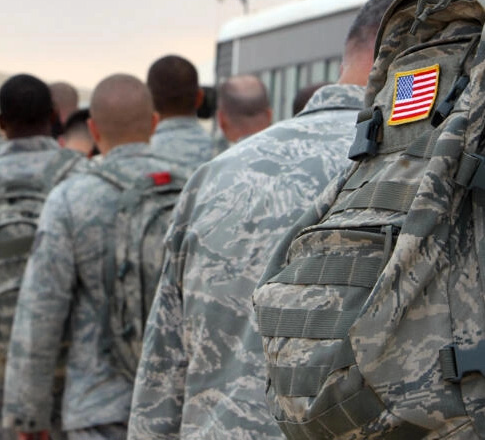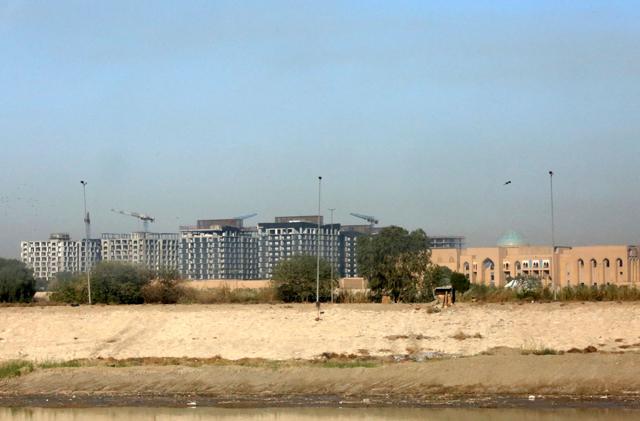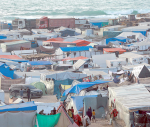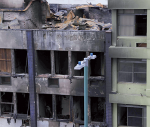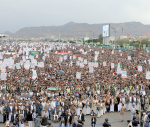You are here
Pentagon chief in Iraq says US wants to ‘strengthen’ ties
By AFP - Mar 07,2023 - Last updated at Mar 07,2023
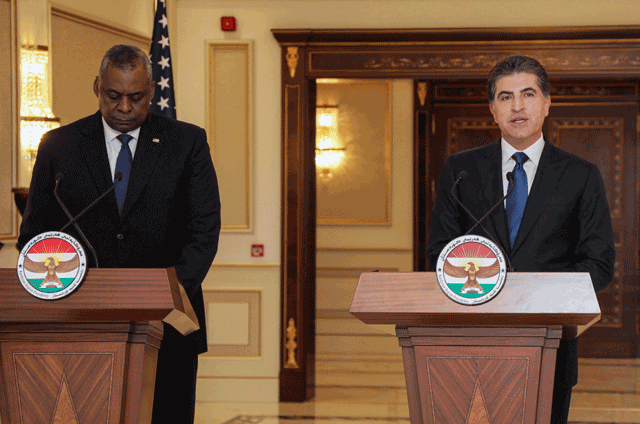
The President of the Iraqi Kurdistan autonomous region Nechirvan Barzani (right) gives a joint press conference with US Defence Secretary Lloyd Austin in the regional capital Erbil on Tuesday (AFP photo)
BAGHDAD — Pentagon chief Lloyd Austin said on Tuesday he hoped to “strengthen and broaden” relations with Iraq, on a Baghdad visit ahead of the 20th anniversary of the US-led invasion that toppled Saddam Hussein.
Defence Secretary Austin also told Iraqi Prime Minister Mohammed Shia Al Sudani that US troops were “ready to remain” in the country at Baghdad’s invitation, a thorny issue that has divided public opinion in both countries.
The visit, which had not been publicly announced in advance, comes ahead of the March 20 anniversary of the ground invasion in March 2003 that started two decades of bloodshed that Iraq is only now beginning to exit.
“I am optimistic about the future of our partnership,” Austin told reporters in Baghdad after meetings with Sudani and Iraqi Defence Minister Thabet Al Abbasi.
“The United States will continue to strengthen and broaden out partnership in support of Iraqi security, stability and sovereignty.”
The Iraqi premier told Austin he also wanted to “strengthen and consolidate relations” with Washington, and underlined Baghdad’s commitment to “maintaining balanced relations with the regional and international powers”.
Since US-led coalition troops ousted Saddam’s Sunni Arab-dominated regime, Iraq’s Shiite majority has led Iraq under a confessional power-sharing system.
Successive governments in Baghdad have forged close ties with Iraq’s Shiite-led neighbour Iran, the arch foe of the United States, in a delicate balancing act.
Both Washington and Tehran provided extensive support during Iraq’s fightback against the Sunni extremists of the Daesh group, who overran swathes of northern and western Iraq in 2014.
The militants were ousted from Iraqi territory in 2017 but retain sleeper cells in desert and mountain hideouts in both Iraq and neighbouring Syria.
‘Vital work’
Iraq announced the end of combat operations by US-led coalition forces at the end of 2021 but some 2,500 American non-combat troops remain deployed to provide advice and training.
“We must be able to operate safely and securely to continue this vital work”, Austin said.
In recent years, bases hosting coalition forces have come under drone and rocket attacks blamed on pro-Iranian factions.
The Pentagon chief thanked Sudani and Abassi for “their commitment to ensure that the coalition forces in Iraq... will be protected from state and non-state actors”.
Austin’s visit comes after he held talks in neighbouring Jordan with King Abdullah II.
While there, Austin voiced “his concerns on a range of shared challenges, including... maintaining focus on security and stability in Iraq, and countering other destabilising activities in the region”, a Pentagon statement said.
Despite its vast oil and gas reserves, Iraq has suffered from decades of underinvestment in its infrastructure and public services that have sparked repeated waves of protests.
October 2021 elections were followed by a whole year of political vacuum before Sudani was sworn in at the head of a government led by pro-Iran factions.
The political arm of Iraq’s Hashed Al Shaabi (Popular Mobilisation) paramilitary force, made up heavily of Tehran-trained groups, has long demanded the departure of all remaining coalition troops, although its calls have been less shrill since it entered government.
There had been a sharp deterioration in US-Iraqi ties under the Donald Trump administration following the assassination of Iran’s foreign operations chief General Qassem Soleimani along with his Iraqi lieutenant, Hashed number two Abu Mahdi Al Muhandis, in a drone strike at Baghdad airport in January 2020.
In the run-up to the invasion anniversary, Iraq has hosted a raft of foreign officials, including UN chief Antonio Guterres and the Iranian, Russian and Saudi foreign ministers.
Related Articles
BAGHDAD — Iraq and the United States on Saturday held a first round of talks on the future of American and other foreign troops in the count
BAGHDAD — Iraq accused the United States of contributing to a "reckless escalation" of violence in the region after American air strikes tar
BAGHDAD — Two rockets targeted Baghdad’s ultra-secure Green Zone that houses the US embassy early Sunday, Iraq’s security forces said in a s


